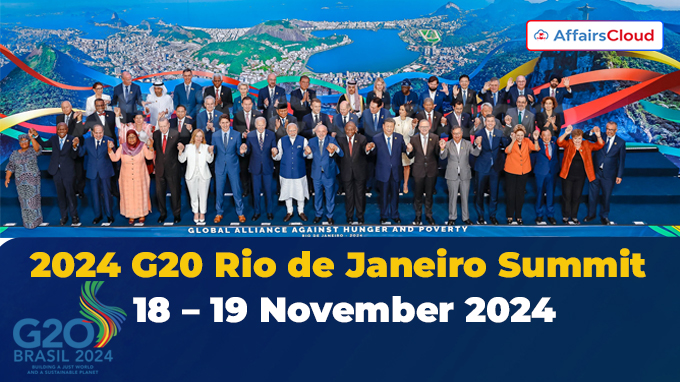
The 19th Group of 20 (G20) Leaders’ Summit for 2024, under the Presidency of Brazil was held in Rio de Janeiro, Brazil from 18th to 19th November 2024.
- The summit was held under the theme “Building a Just World and a Sustainable Planet”.
Note: The 18th G20 Heads of State and Government Summit was hosted by India in New Delhi from 9th to 10th September 2023 under the theme “Vasudhaiva Kutumbakam” or “One Earth-One Family-One Future”.
About G20:
i.It is an informal grouping of 19 countries: Argentina, Australia, Brazil, Canada, China, France, Germany, India, Indonesia, Italy, Japan, Korea, Mexico, Saudi Arabia, South Africa, Russia, Türkiye, the United Kingdom (UK) and the United States of America (USA) and 2 regional bodies: the European Union (EU) and African Union (AU) and was founded in 1999.
ii.The G20 members together constitute around 85% of the world’s Gross Domestic Product (GDP), over 75% of the world trade and around 2/3rd of the world’s population.
G20 Leaders Adopted Rio de Janeiro Declaration
During the summit, leaders of G20 adopted the “G20 Rio de Janeiro Leaders’ Declaration”, which aimed to address major global challenges and crises and promote strong, sustainable, balanced and inclusive growth.
- The declaration was based on the 3 key priorities of the Brazilian G20 presidency: social inclusion and the fight against hunger and poverty; sustainable development, energy transitions and climate action; and the reform of global governance institutions.
Key Points:
i.The declaration has acknowledged the successful New Collective Quantified Goal (NCQG) outcome at Conference of Parties (COP29) United Nations Framework Convention on Climate Change (UNFCCC) held in Baku, Azerbaijan and extend their support to COP30 Presidency which is scheduled to be held Belem, Brazil in 2025.
ii.The declaration has launched the Global Alliance against Hunger and Poverty, to reduce hunger and poverty worldwide.
iii.It endorsed the Rio de Janeiro G20 Ministerial Declaration on International Tax Cooperation. Progressive taxation is one of the key tools that can help to reduce domestic inequalities, strengthen fiscal sustainability, and facilitate the achievement of Sustainable Development Goals (SDGs).
iv.It endorsed the G20 Roadmap towards Better, Bigger, and More Effective Multilateral Development Banks (MDBs), which provides comprehensive suggestions and actions which can help them to maximize their impact in addressing a wide range of global as well as regional challenges.
Brazilian President Luiz Inácio Lula da Silva Launched Global Alliance against Hunger and Poverty
On 18th November 2024, Luiz Inácio Lula da Silva, President of Brazil officially launched the Global Alliance against Hunger and Poverty during the opening session of G20 Leaders’ summit.
- The key target of the alliance is to eradicate hunger (Sustainable Goal (SDG2)) and poverty (SDG 1) by 2030, to reduce inequalities (SDG 10), and contribute to foster global partnerships toward sustainable development.
Need of Global Alliance against Hunger and Poverty:
i.According to the United Nations Food and Agriculture Organisation (FAO)’s official data, 733 million people worldwide are undernourished in 2024.
ii.It is estimated that 622 million people will live below the extreme poverty line of USD 2.15 per day by 2030, which will be double the target level.
- Also, if current trend continues, then 582 million people will in hunger by 2030, nearly the same number as in 2015.
Founding Members:
i.At present, it includes 82 countries such as: India, Argentina, Australia, China, Italy, UK, USA, Japan, and 2 regional organisations like: EU and AU as its founding members.
ii.The Global Alliance includes 24 international organisations such as: FAO, Organisation for Economic Cooperation and Development (OECD), World Health Organisation (WHO), United Nations Development Programme (UNDP), United Nations International Chidren’s Emergency Fund (UNICEF), among others.
iii.It includes 9 international financial institutions: Asian Development Bank (ADB), Asian Infrastructure Investment Bank (AIIB), World Bank Group (WBG), New Development Bank (NDB), among others.
- It also includes 31 philanthropic foundations and Non-Governmental Organisations (NGOs) like: Bill & Melinda Gates Foundation, Oxford Poverty and Human Development Initiative (OPHDI).
Key Targets:
i.It aimed at reaching 500 million people with cash transfer programs in low-and lower-middle-income countries by 2030.
ii.It aimed to expand high-quality school meals to an additional 150 million children in countries where high child hunger rates exists.
iii.It aimed to raise billions in the form of credit and grants through multilateral development banks (MDBs) to implement programs under this global alliance.
Key Features:
i.It will offer a global platform for countries to support each others’ public policies which aimed to eliminate hunger and poverty. It allows any member country to access and share the best practices as well as can provide assistance in the form of technical expertise or financial support.
ii.The Alliance has identified an evidence-based policy basket which includes over 50 policy instruments that member countries can use for framing food policies in their respective countries.
iii.It has outlined 6 “Sprints 2030”, which are seen as high-impact areas for early action such as: school meals, cash transfers, smallholder and family farming support programs, socio-economic inclusion programs, integrated maternal and early childhood interventions, and water access solutions.
iv.It is estimated that USD 2 to USD 3 million required annually for operations of the alliance and will receive financial funding from member countries and institutions such as FAO, UNICEF and the WBG.
- For temporary basis, the alliance will have its base at FAO headquarters in Rome, Italy.
India, Brazil and South Africa Agree to Use Digital Public Infrastructure and AI for Governance
On the sidelines of G20 summit, leaders from the G20 Troika including India, Brazil and South Africa launched a landmark joint declaration on Digital Public Infrastructure (DPI), Artificial Intelligence (AI) and data for governance. It was introduced amid global economic growth stagnating at just over 3%, its lowest rate since the turn of the century.
- The declaration was endorsed by various G20 countries, guest nations and international organisations, highlights the potential of technology to bridge global inequalities and accelerate progress toward SDGs.
- The leaders from G20 troika appreciated global initiatives like: the Global Digital Compact adopted at the United Nations (UN) Summit of the Future and the 2024 Global DPI Summit held in Cairo, Egypt and emphasized that inclusive, development-oriented, and secure technological systems are important for empowering citizens and businesses alike.
Key Points of the declaration:
i.The declaration highlighted the successful experiences of several G20 countries which have showcased that well-designed DPI augmented by AI in fostering equitable digital transformation.
- It underscored that technology if inclusively deployed, have the potential to create new jobs, enhance health and education outcomes and will also help to raise growth, reduce inequality, and achieve the SDGs goals.
ii.The declaration proposed that digital systems are in alignment with foundational principles like: open, modular, interoperable, and scalable, to ensure inclusivity and adaptability to evolving needs of the countries.
- These systems are required to focus on citizens, enabling businesses of all sizes to connect smoothly and improve livelihoods at the grassroots level.
iii.The declaration has recommended for a technology-neutral approach, which will help to foster competition and innovation, reduce digital economic asymmetries and will ensure fair deployment of DPI and AI.
iv.It has emphasized on the development of foundational and frontier AI models trained on diverse and representative datasets.
PM Modi Addressed G20 session on Social Inclusion and Fight against Hunger and Poverty
On 18th November 2024, Prime Minister (PM) Narendra Modi addressed the opening session of the G20 summit on “Social Inclusion and the Fight against Hunger and Poverty”.
- He welcomed the Brazilian G20 presidency agenda focused on SDGs, which would help to highlight the concerns of the Global South.
- He further highlighted that the Indian G20 presidency’s call for “One Earth, One Family, One Future” continued to resonate at the 19th G20 summit.
Key Points:
i.While addressing the session, PM Modi highlighted about Government of India (GoI)’s various initiatives which helped to deal with hunger and poverty.
- He informed that India had lifted 250 million people out of poverty in the last 10 years and was distributing free food grains to over 800 million people in the country.
ii.He further mentioned that under the world’s largest crop insurance scheme, more than 40 million farmers have received benefits worth USD 20 billion.
- Also, the GoI has provided financial assistance worth over USD 40 billion to 110 million farmers.
iii.He also mentioned about several measures taken by the GoI to promote women-led development and social inclusion as more than 300 million women micro entrepreneurs have been linked to banks and given access to credit.
iv.He highlighted the various steps undertaken by the GoI to strengthen food security in Africa and elsewhere.
Italy-India Joint Strategic Action Plan 2025-29
PM Narendra Modi and his Italian counterpart Giorgia Meloni jointly unveiled the “Italy-India Joint Strategic Action Plan 2025-29” during their bilateral meeting held on the sidelines of the G20 summit.
- It is a 5-year strategic action plan which includes collaboration in a range of key sectors including defence, trade, energy and space.
- Also, this marks the 5th bilateral meeting between PMs of India and Italy in the last two years.
Key Areas of Cooperation under Joint Strategic Action Plan:
i.Economic Cooperation: It includes to set up Joint Commission for Economic Cooperation and Italy-India Joint Working Group on food processing, which will increase bilateral trade, market access and investment in various sectors such as: transportation, agricultural products and machinery, wood and furniture, among others.
- It aims to promote industrial collaborations, technological centres and mutual investment which also various sectors like: automotive, semiconductors, infrastructure and advance manufacturing.
ii.Connectivity: It aims to improve collaboration in maritime and land infrastructure also in the framework of the India-Middle East Europe Economic Corridor (IMEEC) and conclude the agreement on cooperation in the maritime and port sector.
- It also includes fostering cooperation on sustainable transport considering environment sustainability and climate change.
iv.Science and Innovation: It includes to expand cooperation on critical and emerging technologies, to foster technology value partnerships between both nations in sectors like: telecommunication, AI, and digitalization of services.
v.Space Sector: It aims to expand the cooperation between the Italian Space Agency (ASI) and the Indian Space Research Organisation (ISRO) and will include projects of common interest in earth observation, heliophysics and space exploration with focus on lunar science.
vi.Energy Transition: It includes to organise “Tech Summits” and industrial ecosystems of both countries will share their best practices and experiences with each other to promote knowledge and foster industrial partnerships.
- Both India and Italy will work together to strengthen the Global Biofuels Alliance and International Solar Alliance (ISA).
vii.Migration and Mobility: A pilot project will be launched to train health professionals in India and will cover their subsequent employment in Italy.
- It aims to improve cooperation to counter the facilitation of irregular migration.
viii.Defence Cooperation: It includes to conduct Joint Defence Consultative (JDC) meetings, Joint Staff Talks (JST) on annually basis to coordinate exchanges of information, visits and training activities.
- It aims to enhance maritime cooperation, including in the field of maritime pollution response and maritime search and rescue.
- It aims to promote a Memorandum of Understanding (MoU) between the Society of Indian Defence Manufacturers (SIDM) and the Italian Industries Federation for Aerospace, Defence and Security (AIAD).
ix.Culture, Academic and People-to-People Exchanges, Cinema and Tourism: It aims to enhance collaboration and exchanges between universities and Higher Education Institutions (HEIs) of the two countries and also to promote cooperation in the field of technical and vocational education.
x.Political Dialogue: It includes to hold meetings and reciprocal visits between Heads of Government, Ministers of Foreign Affairs, Trade and Defence (including on the sidelines of multilateral events) on a regular basis.
PM Modi and Australia PM Anthony Albanese held 2nd India-Australia Summit
On 19th November 2024, PM Narendra Modi and Australian PM Anthony Albanese held the 2nd India-Australia Annual Summit on the sidelines of G20 summit.
- During the meeting, both leaders reaffirmed their commitment to further advance the Comprehensive Strategic Partnership (CSP) in range of areas: defence and security, trade & investment, education, skills, sports, space, critical minerals, ship building, mobility and people-to-people ties.
- 1st India-Australia Annual Summit was held on 10th March, 2023 in New Delhi, India during the State Visit of PM Anthony Albanese to India at the invitation of PM Modi.
Key Highlights:
i.Economy, Trade and Investments: Both leaders acknowledged the increasing bilateral trade, business engagements and market access for goods and services enabled under the landmark India-Australia Economic Cooperation and Trade Agreement (ECTA) which was originally signed in 2022.
- Post implementation of ECTA, bilateral trade between both countries has increased by 40% in the last two years.
- Also, both the leaders appreciated the progress made towards an ambitious, balanced and mutually beneficial Comprehensive Economic Cooperation Agreement (CECA).
- PMs of both countries observed that “Make in India” and “Future Made in Australia” have complementarity and collaborative potential to generate new job opportunities, unleash economic growth and secure the future of both countries in a evolving world.
- Also, they welcomed the extension of the Australia-India Business Exchange (AIBX) programme for next 4 years, starting from July 2024.
ii.Defence and Security Cooperation: Leaders of both countries expressed their intent to renew and strengthen the Joint Declaration on Defence and Security Cooperation in 2025 to reflect ambition in both countries’ elevated defence and security partnership and strategic convergence.
- Both the leaders agreed to develop a joint maritime security collaboration road map.
- They highlighted the importance of defence industry, research and material cooperation, including in the maritime industry.
- They also acknowledged the 1st-ever participation of Indian defence industries in the Indian Ocean Defence & Security 2024 Conference in Perth (Australia) and in the Land Forces Exposition in Melbourne (Australia).
iii.Parliamentary Cooperation: Both the leaders reiterated that inter-parliamentary cooperation is a key component of the CSP.
iv.Education and Sports: Leaders of both countries welcomed the opening of the new Consulate-General of Australia in Bengaluru, Karnataka (India) and the new Consulate-General of India in Brisbane (Australia).
- They look forward to the commencement of Mobility Arrangement for Talented Early –professionals Scheme (MATES) led by Australia, which will boost mobility of early professionals and provide Australian industry access to some of India’s most talented Science, Technology, Engineering and Mathematics (STEM) graduates.
v.Regional and Multilateral Cooperation: Leaders of both countries reaffirmed their commitment to supporting an open, inclusive, stable, peaceful and prosperous Indo-Pacific region which is in consistent with international law, particularly the UN Convention on the Law of the Sea (UNCLOS), including freedom of navigation and overflight.
- They reaffirmed their commitment to bolstering cooperation through Quadilateral Security Dialogue (QUAD). India is scheduled to Quad Leaders’ Summit in India in 2025.
- Both the leaders reflected on the success of the 2024 Indian Ocean Conference, which was co-hosted by Australia and India in Perth, Australia and looked forward to India’s upcoming Indian Ocean Rim Association (IORA) Chairmanship in 2025.
- PM Albanese recognised India’s role in extending development to Pacific nations through Forum for India-Pacific Islands Cooperation (FIPIC) framework.
vi.Energy, Science and Technology, Space and Technology: Both countries welcomed the launch of India-Australia Renewable Energy Partnership (REP). This partnership marks a significant milestone in India-Australia cooperation specifically in the field of climate and energy.
- This partnership would provide the framework for practical cooperation in 8 key priority areas such as: solar Photo Voltaic (PV), green hydrogen, solar supply chains, energy storage, circular economy for renewable energy, two-way investment in renewable energy projects and allied areas, capacity building and other areas of mutual interest.
- Also, both the leaders acknowledged progress under the Memorandum of Understanding (MoU) signed between Khanij Bidesh Limited (KABIL) and Australia’s Critical Minerals Office to advance supply chain diversification interests.
Brazil hands over G20 Presidency to South Africa as 19th G20 Summit Concludes
Brazilian President Luiz Inácio Lula da Silva handed over the G20 Presidency to Cyril Ramaphosa, President of South Africa as 19th G20 Leaders’ Summit concluded on 19th November 2024.
- At the closing of G20 summit, President Lula da Silva highlighted the main achievements of Brazil’s presidency of the forum like: the creation of G20 Social Summit; the framework for improving the MDBs; the setting up of the Women’s Empowerment Working Group; and the inclusion of SDG 18 on ethical-racial equality.
Key Highlights:
i.He hailed the launch of Global Alliance against Hunger and Poverty started an unprecedented debate on taxation. Also, during his presidency, climate change was on the agenda of Finance Ministers and Central Banks and approving the 1st multilateral document on the bio-economy.
ii.He mentioned that over 140 meetings were held in 15 Brazilian Cities. He informed that the definition of the principles on trade and sustainable development and the commitment to increase Renewable Energy (RE) production by 2023.
- During the summit, leaders of G20 appreciated the Coalition for the Local and Regional Production of Vaccines and Medicines and the promotion of investment in public policies to enhance access to water and sanitation.
iii.He informed that by 2026, all the member countries of G20 will have held the presidency at least once.
About Brazil:
Capital- Brasilia
President- Luiz Inácio Lula da Silva
Currency- Brazilian Real (BRL)




